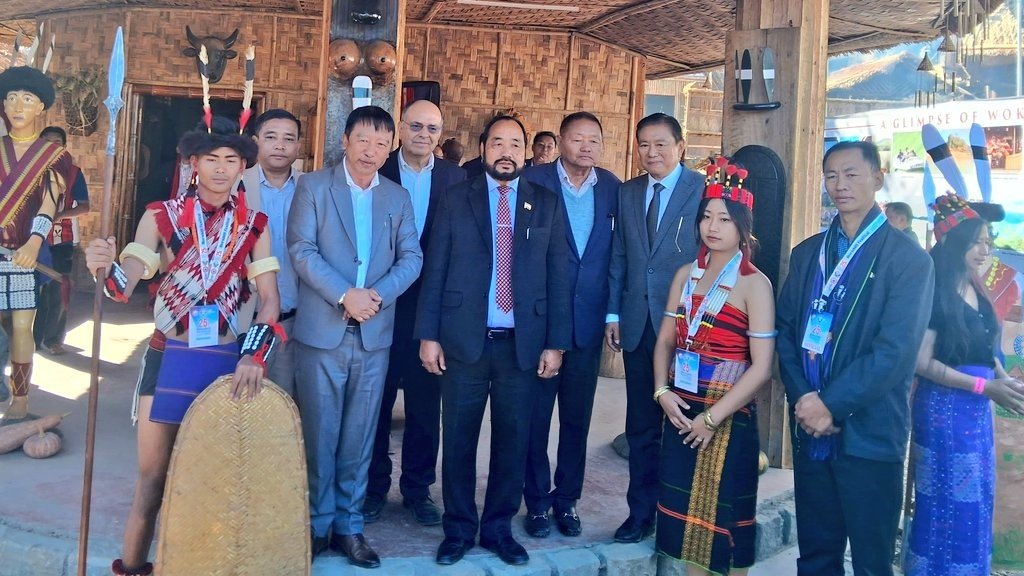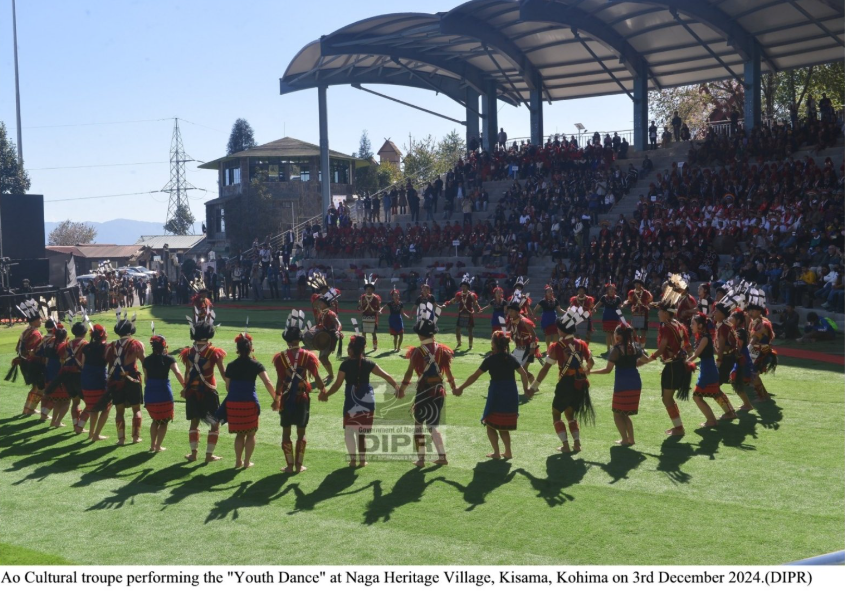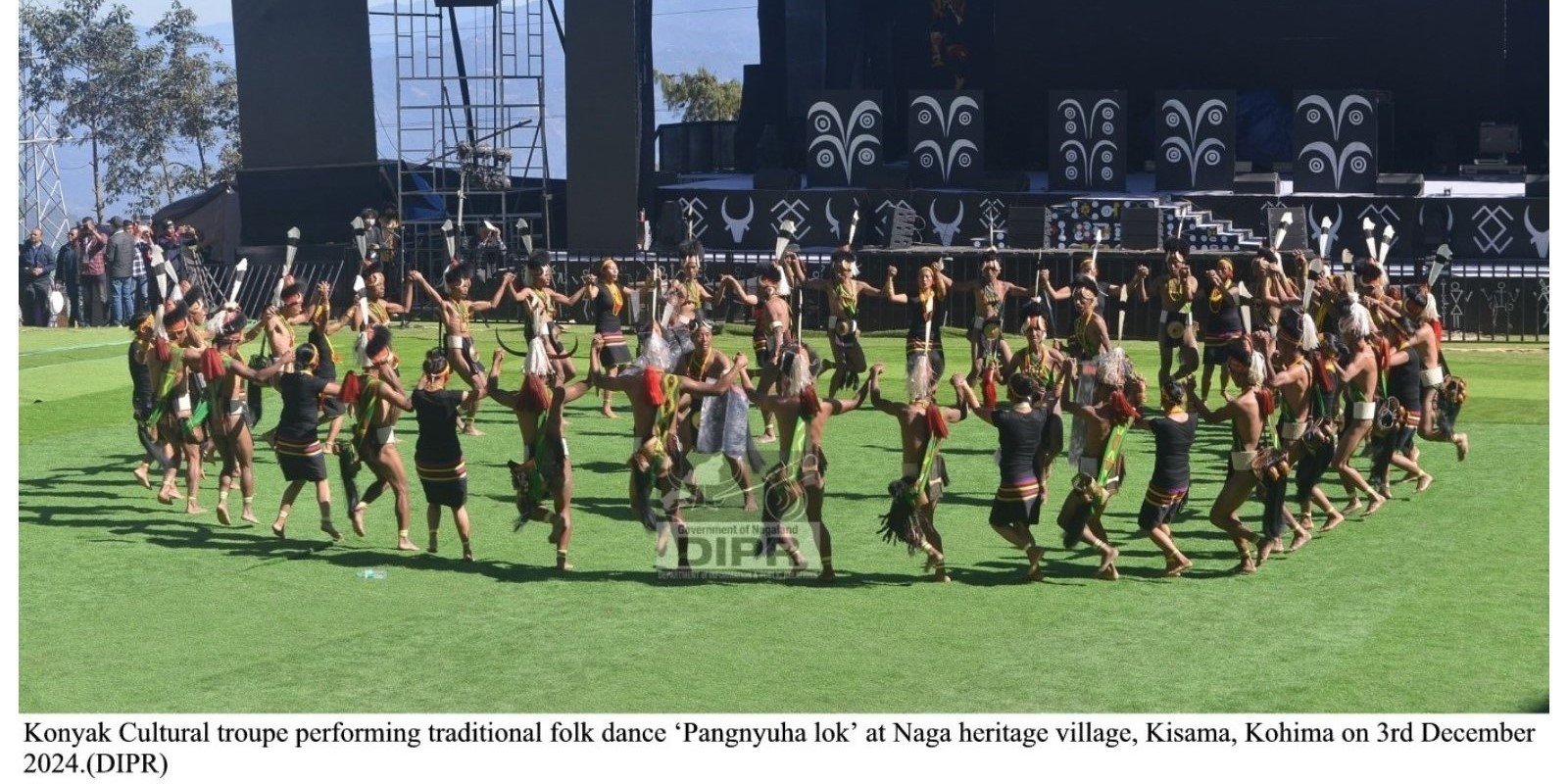The 3rd Day of the 25th edition of the Hornbill Festival at Naga Heritage Village, Kisama witnessed a variety of cultural performances and folk songs and dances of various tribes. The morning session was hosted by Deputy Chief Minister, Home and border affairs, Yanthungo Patton, and Co-hosted by Advisor, Food & Civil Supply, Legal Metrology, K.T Sukhalu and by Chairman Nagaland Honey Mission, Obed Quinker, featuring Minister Tourism Sikkim, Tshering Thendup Bhutia, Chairman SIMFED, Tenzing Dorjee Bhutia and Ambassador of Peru to India, HE Javier Paulinich, Director, Cultural forum Austrian Embassy Michael Pal and Irena Pal Project Manager, Vienna Economic Forum as honored guests.
The event featured traditional dances and songs by cultural troupes presenting: Ao cultural troupe performed the festive dance also known as the “Youth Dance”. As the dance is performed by the youth only to showcase their talents.

The Chang cultural troupe enthralled the gathering with their folk song Chonglichia which is traditionally sung while cutting and pulling the Banyan tree. The Chakhesang Cultural troupe did a commemorative performance which is a celebration of life, continuity and the enduring bonds between families, clans and the land itself., while the Khiamniungan cultural troupe presented Noklie (inter- village rivalry) where all brave and strong male members of the village take guard to defend their village and the people. Garo cultural troupe performed a folk song Bade Dake Na’Ade, the Konyak cultural troupe demonstrated their folk song and dance called Pangnyuha lok which encourages peaceful coexistence and support for each other’s causes. Lotha cultural troupe performed a traditional folk song Tssoktsu Khen (rice pounding folk song) which is a song sung by the Lotha tribe when they gather together to pound rice.

Phom cultural troupe presented yongtap (living stone boulder), Sangtam cultural troupe exhibited a victory dance called Nyichiba Akoh Khi and the Angami cultural troupe demonstrated Tholi which is an indigenous game performed by women folks for fun, enjoyment and leisure. The Rengma cultural troupe performed Ayi Kechu Khwi. This song is sung when clearing and ploughing the field preparing the ground for sowing seeds. The Pochury cultural troupe presented their folk dance Atitidoh, a dance performed to the warriors to pay tributes for their courage and strength. This dance also symbolizes new beginnings in life.
The Sumi cultural troupe demonstrated Aghikutsu Kulu (head hunting). Although head hunting is no longer practised, it is an important part of cultural festivals, reminding the younger generation of the bravery and skill of the ancestors. Tikhir cultural troupe performed a spectacular song called Lasu Nyiong Nyiong which is a friendship song and the Kachari cultural troupe exhibited their folk dance Bai Bin which is accompanied by a stringed instrument bin, Suphen (flute) and Kharam a traditional drum. This dance is performed during Bishu festival. Yimkhiung cultural troupe presented a festive song called Thunyo Khun this song is about merry making with traditional brewed drinks and meat among members of different clans, khel and villages. Kuki cultural troupe performed Khulkon Lam, associated with the journey of the Kuki fore fathers in search of a habitable land.
The final performance of the morning session was by the Zeliang cultural troupe with its mass dance called Chariu Taubo comprising both young and old where both men and women folk dance around singing with spirit of celebration, holding leaves in their hands.


